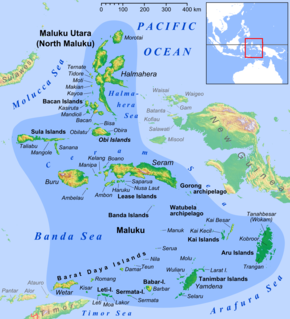
The Maluku Islands or the Moluccas are an archipelago in eastern Indonesia. Tectonically they are located on the Halmahera Plate within the Molucca Sea Collision Zone. Geographically they are located east of Sulawesi, west of New Guinea, and north and east of Timor.

The Bacan Islands, formerly also known as the Bachans, Bachians, and Batchians, are a group of islands in the Moluccas in Indonesia. They are mountainous and forested, lying south of Ternate and southwest of Halmahera. The islands are administered by the South Halmahera Regency of North Maluku Province.
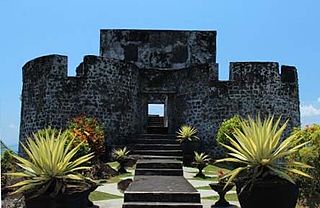
North Maluku is a province of Indonesia. It covers the northern part of the Maluku Islands. The provincial capital is Sofifi, on Halmahera, and the largest population center is the island city of Ternate. The population of North Maluku was 1,038,087 in the 2010 census, making it one of the least-populous provinces in Indonesia; at the latest estimate the population number rose to 1,141,561. The movement of the regional economy in North Maluku is largely derived from the people's economy which relies on the agricultural sector, fisheries and other types of marine products. The main commodities that support economic pulse in North Maluku include copra, nutmeg, cloves, fisheries, gold and nickel. North Maluku's natural products include rice, corn, roasted sweet potatoes, beans, coconut, potatoes, nutmeg, sago, and eucalyptus. The regional economy mostly comes from the people's economy which relies on the agricultural sector, fisheries and other types of marine products.
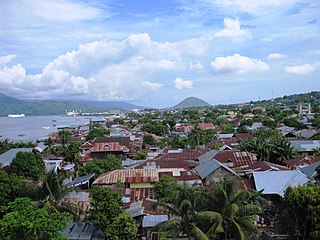
Ternate is the largest city in the Indonesian province of North Maluku and an island in the Maluku Islands. It was the capital of the former Sultanate of Ternate and de facto provincial capital of North Maluku before being moved to Sofifi in 2010. It is off the west coast of the larger island of Halmahera. The city has a population of just under 200,000 on some 111.39 km2.

Tidore is a city, island, and archipelago in the Maluku Islands of eastern Indonesia, west of the larger island of Halmahera. In the pre-colonial era, the Sultanate of Tidore was a major regional political and economic power, and a fierce rival of nearby Ternate, just to the north.
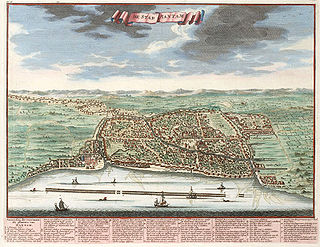
Banten, also written as Bantam, is a small port town located near the western end of Java. It has a secure harbour at the mouth of Banten River that provides a navigable passage for light craft into the island's interior. The town is close to the Sunda Strait through which important ocean-going traffic passes between Java and Sumatra. Formerly Old Banten was the capital of a sultanate in the area, was strategically important and a major centre for trade.

Francisco Serrão was a Portuguese explorer and a cousin of Ferdinand Magellan. His 1512 voyage was the first known European sailing east past Malacca through modern Indonesia and the East Indies. He became a confidante of the Sultan Bayan Sirrullah, the ruler of Ternate, becoming his personal advisor. He remained in Ternate where he died around the same time Magellan died.

The Banten Sultanate was founded in the 16th century and centred in Banten, a port city on the northwest coast of Java; the contemporary English spelling of both was Bantam. It is said to have been founded by Sunan Gunungjati, who had previously founded Cirebon.
This is a timeline of Indonesian history, comprising important legal and territorial changes and political events in Indonesia and its predecessor states. To read about the background to these events, see History of Indonesia. See also the list of Presidents of Indonesia.

Kingdoms of Sunda refers to the monarchies of the Sundanese region prior to the establishment of Indonesia in 1945 AD. The history includes several eras:
- Salakanagara
- Tarumanagara
- The Sunda Kingdom and Galuh Kingdom
- Kingdom of Sumedang Larang, The Sultanate of Banten & The Sultanate of Cirebon
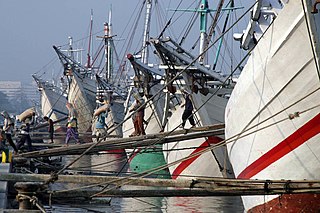
Sunda Kelapa is the old port of Jakarta located on the estuarine of Ciliwung River. "Sunda Kalapa" is the original name, and it was the main port of Hindu Sunda Kingdom of Pajajaran. The port is situated in Penjaringan sub-district, of North Jakarta, Indonesia. Today the old port only accommodate pinisi, a traditional two masted wooden sailing ship serving inter-island freight service in the archipelago. Although it is now only a minor port, Jakarta has its origins in Sunda Kelapa and it played a significant role in the city's development. The port is currently operated by the state-owned Indonesia Port Corporations.
The Dutch East India Company had a presence in the Malay archipelago from 1603, when the first trading post was established, to 1800, when the bankrupt company was dissolved, and its possessions nationalised as the Dutch East Indies.

Port of Tanjung Priok is the busiest and most advanced Indonesian seaport, handling more than 50% of Indonesia's trans-shipment cargo traffic. The port is located at Tanjung Priok, North Jakarta, which is operated by Indonesian state owned PT Pelindo II. The port loaded and unloaded 6.2 million, 6.92 million, and 7.8 million TEUs of cargo during 2016, 2017 and 2018 respectively, out of a total capacity of about 8 million TEUs.The container port ranked as 22nd busiest in the world by Lloyd's One Hundred Ports 2019.
The Sultanate of Ternate, previously also known as The Kingdom of Gapi is one of the oldest Muslim kingdoms in Indonesia besides Tidore, Jailolo, and Bacan. Sultanate of Ternate was established by Momole Ciko, the first leader of Ternate, with the title Baab Mashur Malamo, in 1257. It reached its Golden Age during the reign of Sultan Baabullah (1570–1583) and encompassed most of the eastern part of Indonesia and a part of southern Philippines. Ternate was a major producer of cloves and a regional power from the 15th to 17th centuries.
Indo people are a Eurasian people of mixed Indonesian and European descent. Through the 16th and 18th century known by the name Mestiço. To this day they form one of the largest Eurasian communities in the world. The early beginning of this community started with the arrival of Portuguese traders in South East Asia in the 16th century. The second large wave started with the arrival of the Dutch East India Company (VOC) employees in the 17th century and throughout the 18th century. Even though the VOC is often considered a state within a state, formal colonisation by the Dutch only commenced in the 19th century.

Fort Oranje is a 17th-century Dutch fort located at the center of Ternate City on the island of Ternate, one of the Moluccas in Indonesia. The fort is the largest in Ternate Island. Fort Oranje was once the capital of Dutch East India Company's trade empire in Asia until it was moved to Batavia.

Fort Tolukko is a small fortification on the east coast of Ternate facing Halmahera. It was one of the colonial forts built to control the trade in clove spices, which prior to the eighteenth century were only found in the Maluku Islands. It has been variously occupied by the Portuguese,the native Terate Sultanate, the Dutch, and the Spanish. It was abandoned as a fort in 1864, renovated in 1996, and is now a tourist attraction.

António de Abreu was a 16th-century Portuguese navigator and naval officer. He participated under the command of Afonso de Albuquerque in the conquest of Ormus in 1507 and Malacca in 1511, where he got injured. Departing from Malacca in November 1511 with four ships, in an exploratory voyage to the 'Spice Islands' of Maluku, he led the first European expedition to reach Timor and the Banda Islands, in Indonesia, in 1512.
Mona Lohanda is an Indonesian historian, archivist and academic, as well as a former curator of the National Archives of Indonesia. She is a leading authority on the history of Batavia, as well as its Chinese-Indonesian community.




























